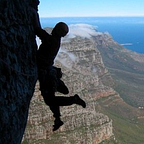Does falling off a cliff make you a better employee?
The most surprising part of plummeting through the air upside down, feeling the ground rush towards me, was the sense of complete calm. I shouldn’t have been calm in the slightest. Maybe it was the speed at which it had happened. One moment I’m balancing nicely on the rock, my fingers secure in a good jamming crack, the next thing I know I’m looking at the sky above my feet. I’m falling too far. My protection must have ripped out in the fall, flipping me upside down. Luckily the next piece holds. I feel the rope tighten, yanking me back upright, as I swing round like a pendulum. My feet brushing the few centimeters of air remaining between me and the ground.
I look at my climbing partner. “Are you alright?” He asks, shock registering on his face. “I think so,” I say, feeling slightly dazed. I look down, as if to check myself over, and notice a flash of pure white at the end of my middle finger. Bone exposed to the Scottish air. “Shit,” I think, knowing I’ve ripped the end of my finger off.
Suddenly the world is in sharp focus. The course of action crystal clear in my head. I start giving orders, galvanising people who are staring at my finger, unsure how to react. “Scott! First aid kit.” “Andy, you’ll have to drive me, the ambulance will take too long to come up that road!” A perverse part of me knows that I’ll regret not having a photo of my finger but it feels slightly too serious for that.
“We’re going to need to clean this,” the nurse says conversationally as she pours surgical spirit over the tip of my finger and begins scrubbing. I start screaming.
Years later I’m reminded of this story. My friend has just declared that rock climbers make great employees, listing ‘clear thinking under pressure’ among the reasons. We sit looking out at the autumn towers of granite stretching into the sky, our feet dangling over the three hundred meter drop beneath us. I can see his argument for ‘problem solving’. An important part of many jobs, it also lies at the heart of rock climbing. One half of the intoxicating fusion of mind and body, strength and wits. Working out the sequence of moves needed to inch higher up the cliff, a puzzle shaped by thousands of years of glaciers, rain, baking summers and freezing winters. While at the same time seeking out potential climbing gear placements and quickly matching the right piece to the rock feature so you preserve your energy.
He rattles off other examples: focus, determination, overcoming challenges, acting on incomplete knowledge and making the right judgments. The last ones take me back a couple of years to high in the Canadian Rockies.
Glancing down I see my rope disappearing into space, flapping in the wind that whipped round the mountain. Trying not to think of the long drop to the solitary piece of protection I’d found I gave the other rope a pull. It remained hopelessly stuck. I screamed silently in frustration. The wind replied, harsh in my ears. There was no choice but to carry on, not knowing how far I’d get before the wall became impassable. Denying me passage on a whim.
We’d just finished a magnificent climb and were abseiling down the other side of the mountain when one of our ropes had got caught on something. After pulling delicately and tugging roughly from various angles, we’d weighed up our options and decided to attempt climbing the unknown cliff face to retrieve our rope. It looked possible and having abseiled down we knew it wasn’t too steep but we were just making an educated guess. Relying on fortune and experience. Every step up chipping away at my resolve.
The climbing remained solid and doable. Under different circumstances it might even have been enjoyable. Luckily a few meters higher a good tug released the rope. It tumbled down to my partner below and I started delicately working my way back down the cliff.
Equally important to making judgement calls, though, is the ability to recognise when you’re wrong and either adjust course midway or cut your losses. It’s surprisingly hard to give up on a climb. The physical and mental energy expended to get this far and the desire to avoid a disappointing failure can be a formidable combination to overcome. Denial and persistence a more appealing option. However, sometimes the hard call has to be made. To concede to the mountain. Admit it has defeated you. But know you’ll come back stronger for the experience.
These moments of adversity can define who we are. At work or at play. But it’s the moments in between that we live for. When you’re swept up in the presence and it feels like nothing can go wrong. Whether your new product is experiencing hockey-stick growth or you’re high in the alpine, jagged peaks spearing the sky, sun glancing off the rock as you pull through an overhang, reveling in the wild exposure of your position.
Other popular posts:
- Here be Dragons! Er…I mean False Positives… How to avoid confirmation bias and think like a scientist.
- 8 Things I’ve Learned Product Managing Car Hire during the journey to 10 times growth within 2 years!
- Big, Bad, I Said No! Saying no to feature requests: why, how and what happens when you don’t.
